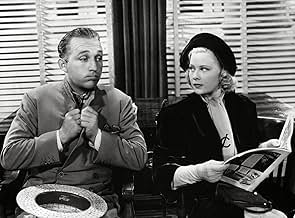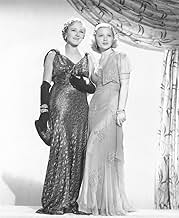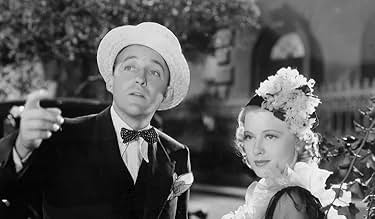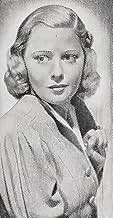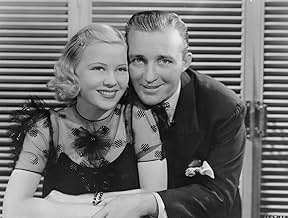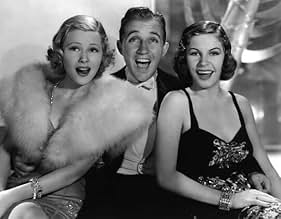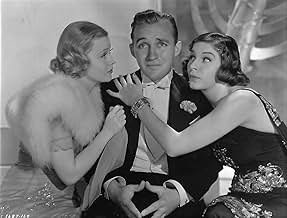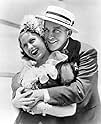CALIFICACIÓN DE IMDb
6.4/10
289
TU CALIFICACIÓN
Agrega una trama en tu idiomaAccording to the will of an eccentric millionaire, one of four randomly chosen strangers will become his heir if he/she can double $5000 by honest means.According to the will of an eccentric millionaire, one of four randomly chosen strangers will become his heir if he/she can double $5000 by honest means.According to the will of an eccentric millionaire, one of four randomly chosen strangers will become his heir if he/she can double $5000 by honest means.
Argumento
¿Sabías que…?
- TriviaOne of over 700 Paramount Productions, filmed between 1929 and 1949, which were sold to MCA/Universal in 1958 for television distribution, and have been owned and controlled by Universal ever since; its earliest documented telecast took place in Seattle Tuesday 25 November 1958 on on KIRO (Channel 7); it was released on DVD 14 November 2006 as one of 5 titles in Universal's Bing Crosby Screen Legend Collection, and again 11 November 2014 as one of 24 titles in Universal's Bing Crosby Silver Screen Collection.
- Citas
Jonathan Clark: Will you have a cocktail?
Liza Lou Lane: No. No alcohol, kid. I get a feelin'z good.
Vicki Clark: What's the matter with feeling good?
Liza Lou Lane: Oh, you don't know how good I can feel.
- ConexionesEdited into Chop Suey (2001)
- Bandas sonorasDouble or Nothing
(uncredited)
Lyrics by Johnny Burke
Music by Victor Young
Played and sung by vocal group during opening credits.
Reprised at the Four Winds Club opening
Opinión destacada
DOUBLE OR NOTHING (Paramount, 1937), directed by Theodore Reed, is an enjoyable, but not particularly original, musical-comedy with a typical story about how found money can change or ruin a person's life. Similar in ways to Paramount's earlier IF I HAD A MILLION (1932), this production focuses primarily on four people in one simple plot instead of separate episodes dealing with different central characters in ten minute segments. It also capitalizes on the quite common rich girl-poor boy theme and setting it to musical interludes.
The film begins with a couple of men walking about town purposely dropping wallets obtaining $100 bills on the sidewalks and over the fences. Numerous people find it and go about their way, followed by a lone dog picking up the wallet by his mouth, trailing around until he locates "Lefty" Boylan (Bing Crosby), found singing on the stool in a diner while waiting for his meal. Instead of keeping the money, Lefty encounters the address in the wallet, and although he could use the money, he decides to do the correct thing and return it to the rightful owner. Entering a lawyer's office, Lefty finds himself being seated along with three other people, Liza Lou Lane (Martha Raye), a former burlesque entertainer, "Half Pint" (Andy Devine), a tramp, and John Pederson (William Frawley), a gambler. These four turn out to be the only ones honest enough to not take the money and run. They then learn from an attorney the purpose of the wallets and of a last will and testament from a deceased millionaire who wants to prove that there are still intelligent and honest people left in the world, and as for their honesty, they are each rewarded $5,000 with the agreement that the first one to double that gift legitimately within thirty days will get to inherit a million dollars, or else, acquire nothing. The foursome have their own individual ideas on how to double their money and agree they should divide half of the estate among others. Lefty, an unemployed singer, decides to use his good fortune and open up a night club featuring entertainment acts. However, situations arise when the deceased millionaire's brother, Jonathan Clark (Samuel S. Hinds), feeling cheated of his inheritance, schemes to foil these people's plans, especially in using his pretty daughter, Victoria Clark (Mary Carlisle), to romance Lefty while his younger son, Egbert (William Henry) to do the same with Liza Lou.
In between the plot comes a handful of good listenable tunes, scored by Arthur Freed, Burton Lane, Johnny Burke, Arthur Johnston, Al Siegel and Sam Coslow, including: "Double or Nothing" (sung by chorus during opening credits); "Smarty" (sung by Bing Crosby, accompanied by a singing chef, played by Alfonse Berg); "All You Have to Do Is Dance" (sung by Crosby to Mary Carlisle, with brief dance solo by a policeman, played by Jimmy Notaro); "It's the Natural Thing to Do" (sung by Crosby to Carlisle); "It's On, It's Off" (sung by Martha Raye); "The Moon Got In My Eye" (sung by Crosby); "Listen, My Children" (sung by Martha Raye); "Swan Waltz" (instrumental); "It's On, It's Off" (reprise by Raye); "Double or Nothing," "Double or Nothing" (reprise/ sung by chorus); "Clarinet Virtuoso" (performed by Ames and Arno); "The Moon Got In My Eye" (reprise, sung by Crosby); The Calgary Brothers Comedy Act (performed by Steve and Andre Calgary) followed by them singing "The Moon Got In My Eye," "After You" (sung by Frances Faye, Martha Raye, Bing Crosby and Harry Barris) and "It's the Natural Thing to Do" (reprise by Crosby). Of the Crosby tunes, the ones that come off best are "It's the Natural Thing to Do" and "The Moon Got In My Eye," with the latter beautifully performed instrumentally by a sing and humming band of twenty voices in the place of an orchestra. A novel idea. On the funny side, Martha Raye, a burlesque dancer, finds herself unable to control herself by doing a striptease act every time she hears the music to "It's On, It's Off," and at one point, continues to sing under the bubbles while submerging under water during a police raid. For the finale in the night club variety act comes the jive singing of Frances Faye and Martha Raye to the tune "After You." With their last names sounding alike (Faye and Raye), so does their loud vocalizing.
The supporting players include: Benny Baker as The Sailor; Fay Holden as Martha Sewell Clark; Walter Kingsford as Dobson; Gilbert Emery as Mitchell; John Gallaudet as Johnny Rutherford; and Harry Barris, (a familiar face in numerous Crosby musicals, mainly because he was part of his "Rhythm Boys" singing trio in his early days), playing an orchestra leader. Resident Hollywood drunks Charles Irwin and Arthur Housman can be seen briefly in the golf course scene, which is highlighted by Martha Raye opening her big mouth, belting out a giant cry that stops her short when a flying golf ball enters her mouth, causing her to swallow it.
Bing Crosby and his doll-faced blonde co-star, Mary Carlisle, make a fine on-screen couple. First paired in COLLEGE HUMOR (1933), they reunited for the third and final time in DOCTOR RHYTHM (1938), in which Andy Devine, who appears in DOUBLE OR NOTHING, appears with them once more.
The story used in DOUBLE OR NOTHING appears to be more interesting than the somewhat overlong musical and comedy acts performed in the night club sequence shortly before the close of this 94 minute production, but the good tunes, lavish sets and fine performances keep this from being just another mediocre musical. Rarely seen in recent years, it's worth rediscovering again. (***)
The film begins with a couple of men walking about town purposely dropping wallets obtaining $100 bills on the sidewalks and over the fences. Numerous people find it and go about their way, followed by a lone dog picking up the wallet by his mouth, trailing around until he locates "Lefty" Boylan (Bing Crosby), found singing on the stool in a diner while waiting for his meal. Instead of keeping the money, Lefty encounters the address in the wallet, and although he could use the money, he decides to do the correct thing and return it to the rightful owner. Entering a lawyer's office, Lefty finds himself being seated along with three other people, Liza Lou Lane (Martha Raye), a former burlesque entertainer, "Half Pint" (Andy Devine), a tramp, and John Pederson (William Frawley), a gambler. These four turn out to be the only ones honest enough to not take the money and run. They then learn from an attorney the purpose of the wallets and of a last will and testament from a deceased millionaire who wants to prove that there are still intelligent and honest people left in the world, and as for their honesty, they are each rewarded $5,000 with the agreement that the first one to double that gift legitimately within thirty days will get to inherit a million dollars, or else, acquire nothing. The foursome have their own individual ideas on how to double their money and agree they should divide half of the estate among others. Lefty, an unemployed singer, decides to use his good fortune and open up a night club featuring entertainment acts. However, situations arise when the deceased millionaire's brother, Jonathan Clark (Samuel S. Hinds), feeling cheated of his inheritance, schemes to foil these people's plans, especially in using his pretty daughter, Victoria Clark (Mary Carlisle), to romance Lefty while his younger son, Egbert (William Henry) to do the same with Liza Lou.
In between the plot comes a handful of good listenable tunes, scored by Arthur Freed, Burton Lane, Johnny Burke, Arthur Johnston, Al Siegel and Sam Coslow, including: "Double or Nothing" (sung by chorus during opening credits); "Smarty" (sung by Bing Crosby, accompanied by a singing chef, played by Alfonse Berg); "All You Have to Do Is Dance" (sung by Crosby to Mary Carlisle, with brief dance solo by a policeman, played by Jimmy Notaro); "It's the Natural Thing to Do" (sung by Crosby to Carlisle); "It's On, It's Off" (sung by Martha Raye); "The Moon Got In My Eye" (sung by Crosby); "Listen, My Children" (sung by Martha Raye); "Swan Waltz" (instrumental); "It's On, It's Off" (reprise by Raye); "Double or Nothing," "Double or Nothing" (reprise/ sung by chorus); "Clarinet Virtuoso" (performed by Ames and Arno); "The Moon Got In My Eye" (reprise, sung by Crosby); The Calgary Brothers Comedy Act (performed by Steve and Andre Calgary) followed by them singing "The Moon Got In My Eye," "After You" (sung by Frances Faye, Martha Raye, Bing Crosby and Harry Barris) and "It's the Natural Thing to Do" (reprise by Crosby). Of the Crosby tunes, the ones that come off best are "It's the Natural Thing to Do" and "The Moon Got In My Eye," with the latter beautifully performed instrumentally by a sing and humming band of twenty voices in the place of an orchestra. A novel idea. On the funny side, Martha Raye, a burlesque dancer, finds herself unable to control herself by doing a striptease act every time she hears the music to "It's On, It's Off," and at one point, continues to sing under the bubbles while submerging under water during a police raid. For the finale in the night club variety act comes the jive singing of Frances Faye and Martha Raye to the tune "After You." With their last names sounding alike (Faye and Raye), so does their loud vocalizing.
The supporting players include: Benny Baker as The Sailor; Fay Holden as Martha Sewell Clark; Walter Kingsford as Dobson; Gilbert Emery as Mitchell; John Gallaudet as Johnny Rutherford; and Harry Barris, (a familiar face in numerous Crosby musicals, mainly because he was part of his "Rhythm Boys" singing trio in his early days), playing an orchestra leader. Resident Hollywood drunks Charles Irwin and Arthur Housman can be seen briefly in the golf course scene, which is highlighted by Martha Raye opening her big mouth, belting out a giant cry that stops her short when a flying golf ball enters her mouth, causing her to swallow it.
Bing Crosby and his doll-faced blonde co-star, Mary Carlisle, make a fine on-screen couple. First paired in COLLEGE HUMOR (1933), they reunited for the third and final time in DOCTOR RHYTHM (1938), in which Andy Devine, who appears in DOUBLE OR NOTHING, appears with them once more.
The story used in DOUBLE OR NOTHING appears to be more interesting than the somewhat overlong musical and comedy acts performed in the night club sequence shortly before the close of this 94 minute production, but the good tunes, lavish sets and fine performances keep this from being just another mediocre musical. Rarely seen in recent years, it's worth rediscovering again. (***)
- lugonian
- 28 ago 2003
- Enlace permanente
Selecciones populares
Inicia sesión para calificar y agrega a la lista de videos para obtener recomendaciones personalizadas
Detalles
- Fecha de lanzamiento
- País de origen
- Idioma
- También se conoce como
- Double or Nothing
- Locaciones de filmación
- Productora
- Ver más créditos de la compañía en IMDbPro
- Tiempo de ejecución1 hora 30 minutos
- Color
- Relación de aspecto
- 1.37 : 1
Contribuir a esta página
Sugiere una edición o agrega el contenido que falta

Principales brechas de datos
By what name was Doble o nada (1937) officially released in India in English?
Responda
